Private Tour of Carnegie Hall
Join an exclusive tour of the famed Manhattan music venue which dates to 1891!


The United Nations headquarters in Midtown Manhattan is full of fun secrets, many of which we highlighted in 2020 to mark the 75th anniversary of the organization. Untapped New York was proud to be an official collaborator with the United Nations on the UN75 efforts and have welcomed Visit UN, which has offered some of its excellent virtual tours to our Insiders members. Today, we’re sharing a new discovery from our exploration into the United Nations headquarters. Atop the United Nations Secretariat Building was once a private apartment for the UN Secretary-General!
The all-glass curtain wall building stands 39 stories tall and hosts about 5,000 international civil servants working inside on a daily basis in normal operation (the United Nations complex has been closed since March due to COVID-19). Since the opening of the UN headquarters, the Secretary-General and his direct staff have worked on the 38th floor. Those who work in the United Nations use the shorthand “38th floor” to refer to the topmost leadership of the UN.
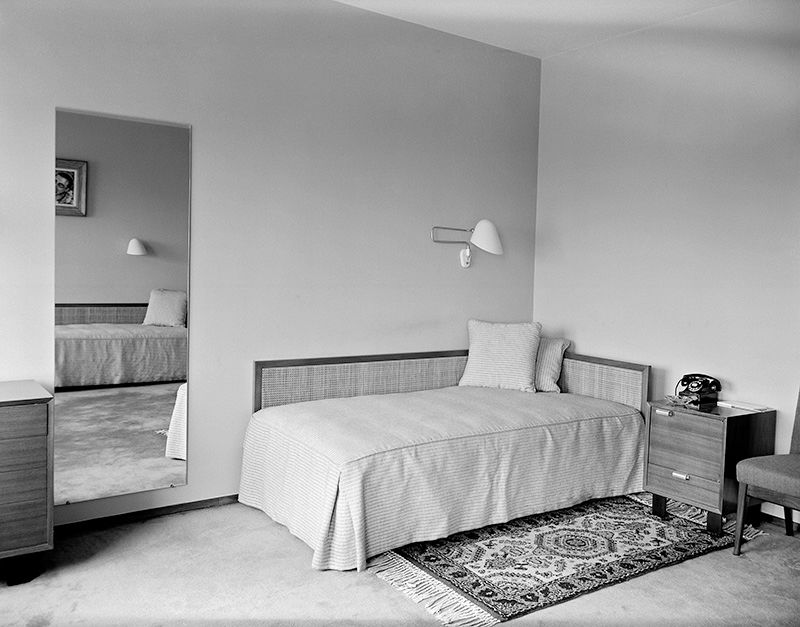
The bedroom of the United Nations Secretary-General apartment in the UN Headquarters in 1953. UN Photo/MB.
In addition to offices and conference rooms on the 38th floor, there was also a once a private apartment for the Secretary-General. Historic photos from the United Nations from the 1950s show a nice-sized living room with large windows that span the width of the room, a modest kitchen and bathroom, and a single bed in the bedroom. There was also a private conference room.
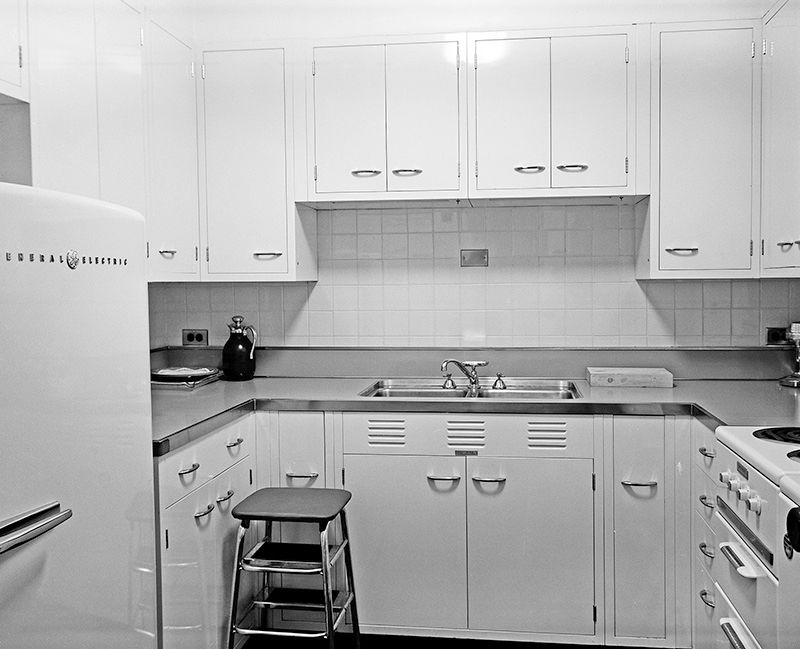
The kitchen of the United Nations Secretary-General apartment in the UN Headquarters in 1953. UN Photo/MB.
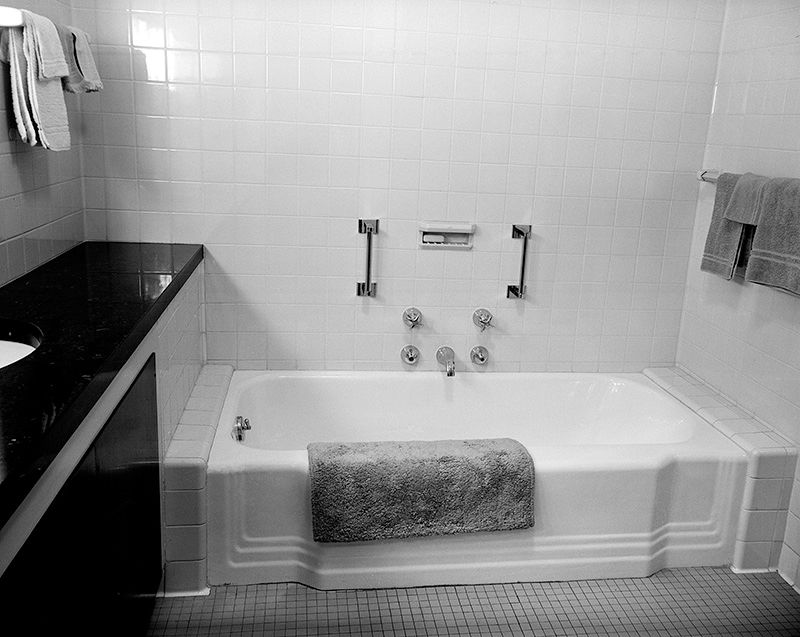
The bathroom of the United Nations Secretary-General apartment in the UN Headquarters in 1953. UN Photo/MB.
In 1958, a New York Times article (as included in the Senate Congressional record), reported that Hammarskjöld proposed a secret summit at the United Nations to discuss Middle East peace negotiations to be attended by U.S. President Eisenhower, Russian Premier Nikita Khrushchev, Indian Prime Minister Jawaharlal Nehru, British Prime Minister Harold Macmillan, French Premier Charles de Gaulle, and Hammarskjöld. Hosting the meeting in the apartment would allow the UN to circumvent rules in place for meeting in the Security Council chamber or other locations in the headquarters. It was suggested in the article “that it might be better for the Soviet Premier to stay in Mr. Hammarskjöld’s 1-bedroom apartment on the 38th floor if the discussions were held at the United Nations.”
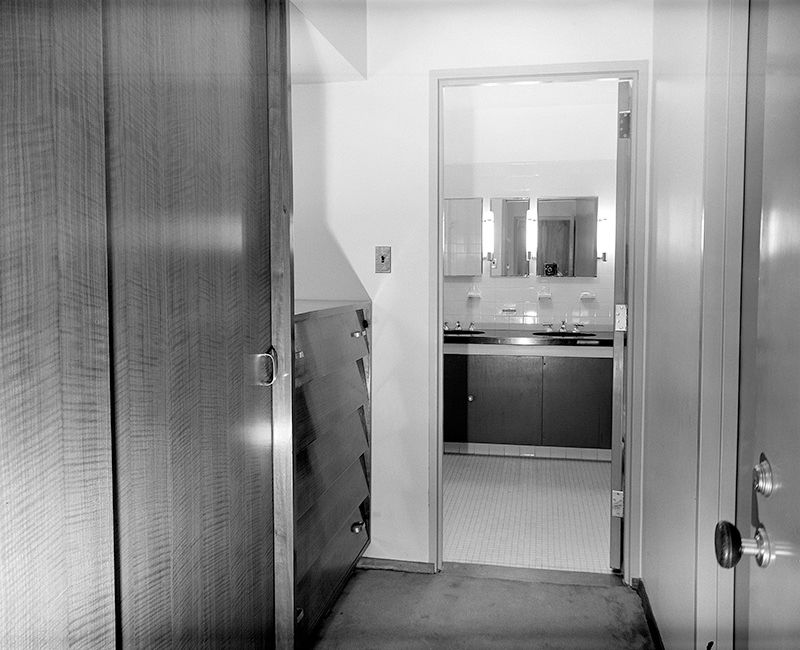
The closets and hallway of the United Nations Secretary-General apartment in the UN Headquarters in 1953. UN Photo/MB.
Hammarskjöld was a culture aficionado, and borrowed paintings by Pablo Picasso, Henri Matisse, Georges Braque, Fernand Leger, Fritz Glarner, and Juan Gris from The Museum of Modern Art to display on the 38th floor.
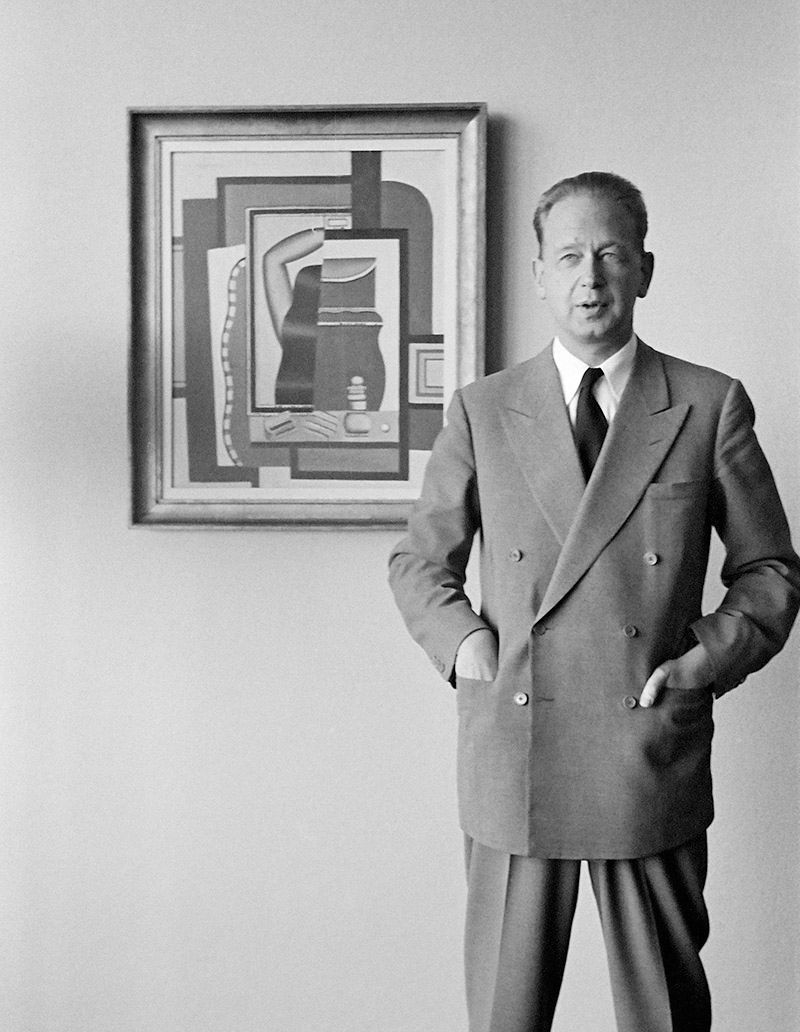
UN Secretary-General Dag Hammarskjöld photographed in his private apartment on the 38th floor of the Secretariat building, at United Nations Headquarters, standing in front of “Woman Combing Her Hair,” a painting by Fernand Leger, lent to the United Nations by New York’s Museum of Modern Art in 1954. UN Photo/MB.
Hammarskjöld also had his own apartment on East 73rd Street leased by the United Nations where he was said to host private dinner parties “for the likes of conductor Leonard Bernstein, violinist Fritz Kreisler, cellist Pablo Casals, author James Michener, and their wives. His fellow Swede, the reclusive movie actress Greta Garbo, was also a frequent guest,” writes Peter B. Heller in The United Nations Under Dag Hammarskjold, 1953-1961. That being said, continues Heller, there was much speculation about Hammarskjöld’s sexual orientation at the time as he was unmarried and appeared to “shun the company of women.” Perhaps it explains the single bed in the photographs of the UN apartment in the 1950s. Sadly, Hammarskjöld died in a plane crash in 1961 en route to a peacekeeping mission in the Congo. A nearby park, which often has public art installed, is named for him.
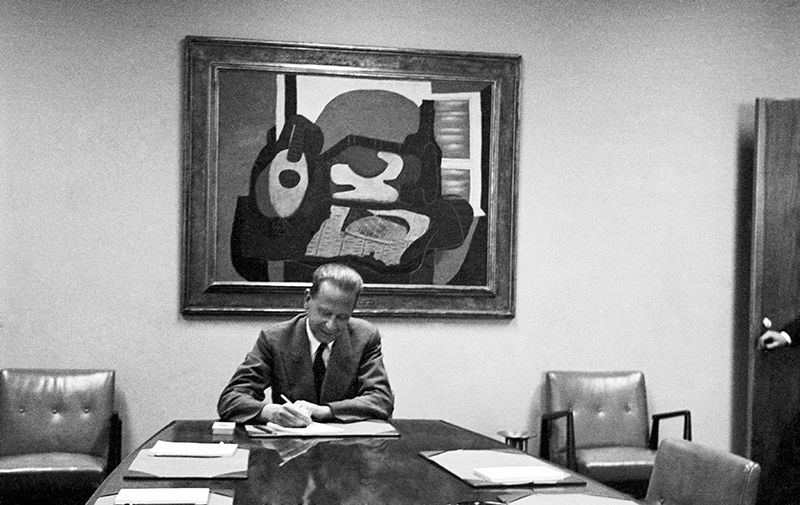
Mr. Dag Hammarskjöld, Secretary – General of the United Nations, photographed in his private conference room, on the 38th floor of the Secretariat building. Hanging on the wall behind Mr. Hammarskjöld, is “Still Life with Cake,” a painting by Pablo Picasso which was lent to the United Nations by New York’s Museum of Modern Art. This painting was done in 1923, when the artist was in his late cubist period. UN Photo/MB.
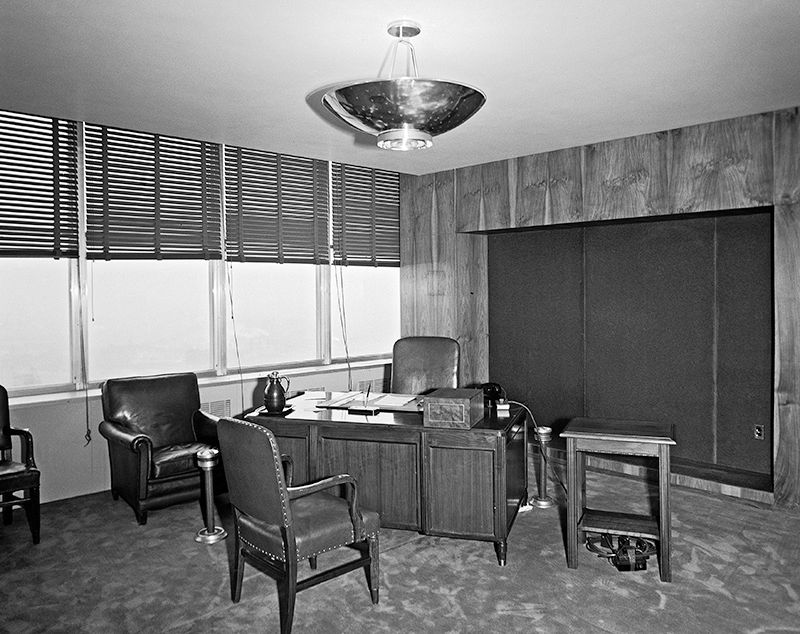 Office of the President of the General Assembly on the 38th floor of the Secretariat Building. January 1951.
Office of the President of the General Assembly on the 38th floor of the Secretariat Building. January 1951.
The 38th floor apartment at the United Nations continued to be used after Hammarskjöld, however. In 1968, it was reported that three formal meetings between the Thai and Cambodian delegations took place with U Thant in the Secretary-General apartment on the 38th floor. Our readers may be familiar with U Thant from Burma, for whom U Thant Island in the East River was informally named. He also had a house in the Bronx in Riverdale leased by the United Nations, according to The New York Times. U Thant held the position until 1971, after which Austrian Kurt Waldheim took the reins.
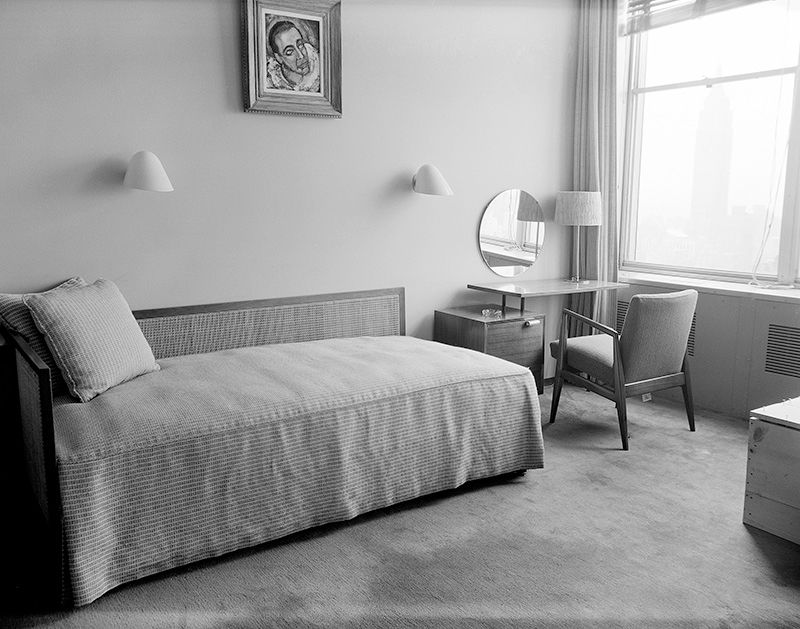
Partial view of the bedroom of the apartment of the UN Secretary-General. UN Photo/MB.
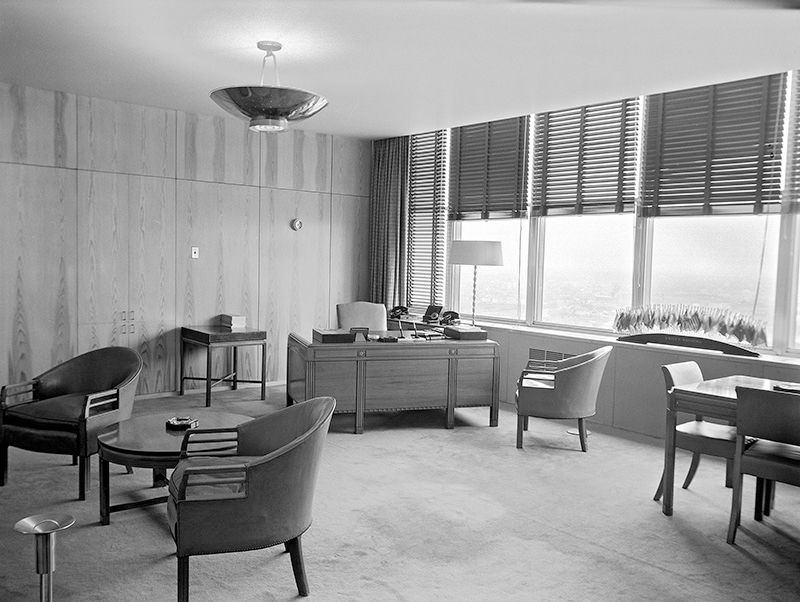
Office of the Secretary-General of the United Nations, on the 38th floor of the Secretariat Building, at UN Headquarters. January 1953. UN Photo/MB
According to Linda Malvern in the book The Ultimate Crime: Who Betrayed the UN and Why, when “Waldheim arrived on the thirty – eighth floor he insisted it be redecorated, recarpeted and with a few exceptions, restaffed.” We assume gone were the priceless MoMA paintings. Furthermore she writes, “Waldheim also wanted an appropriate residence and immediately instructed a UN official, David Vaughan, who ran the UN’s Office of General Services, that a search be made. Waldham’s own idea was an apartment on Fifth Avenue with at least five bedrooms and enough room for two maids.” Apparently there was gossip in the United Nations about this request, as it would have far exceeded the yearly allowance for the apartment of the Secretary-General.
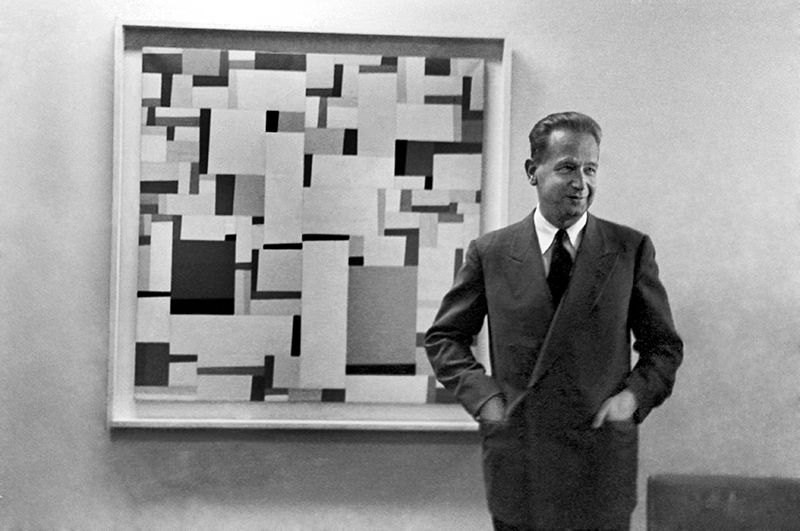 Mr. Dag Hammarskjöld, Secretary-General of the United Nations, photographed in his outer office in 1954, on the 38th floor of the Secretariat building, standing in front of “Rational Look,” a geometrical abstract painting by Fritz Glarner, lent to the United Nations by New York’s Museum of Modern Art.
Mr. Dag Hammarskjöld, Secretary-General of the United Nations, photographed in his outer office in 1954, on the 38th floor of the Secretariat building, standing in front of “Rational Look,” a geometrical abstract painting by Fritz Glarner, lent to the United Nations by New York’s Museum of Modern Art.
The happy result for all was the gift of a Sutton Place townhouse to the non-profit United Nations Association of the United States by Corning Glass heir Arthur Amory Houghton, Jr.. Houghton had purchased the townhouse at No. 3 Sutton Place from the estate of Anne Morgan, the daughter of J.P. Morgan, who built the home for her. The United Nations leased it from the association for the first year, and then bought it outright in 1973. The New York Times writes that it was appraised for at least $1 million in 1972 and that the purchase of the house by the United Nations would include a contribution of “equal amount to some worthy U. N. activity such as its Aid program for refugees or to the United Nations development program.”
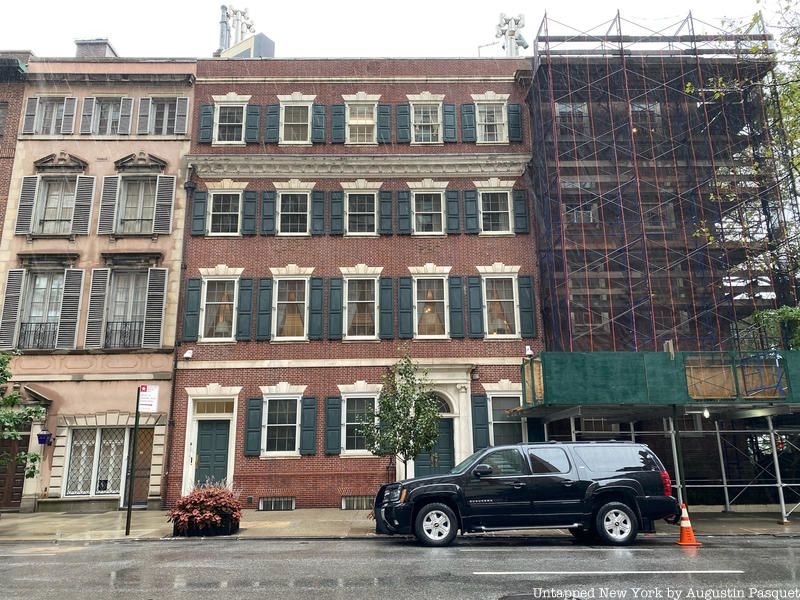
The townhouse at 3 Sutton Place
Under Ban Ki-Moon from Korea, who served as Secretary-General of the UN from 2007 to 2016, the living room, small bathroom, and private conference room was still being used. But the Capital Master Project, the $2.1 billion renovation of the United Nations Complex commenced during Moon’s tenure, and the apartment was converted into offices and conference rooms. Austria donated the new space.
Meanwhile, the townhouse at Sutton Place has been the residence of the UN Secretary General since 1972, home to Waldhan, then Javier Perez de Cuellar from Peru from 1982 to 1991, Boutros Boutros-Ghali from Egypt from 1992 to 1996, then Kofi Annan of Ghana in 1997, who had a unique situation since he already lived in New York City. He left his subsidized Mitchell-Lama housing apartment on Roosevelt Island, where he had lived since 1978. He moved into the Sutton Place townhouse, but appeared to have either retained the lease on Roosevelt Island or passed it on to his son or other family members — a situation that was called out by the New York Sun since it may have prevented other low to middle income families on a long waiting list from attaining that apartment, not to mention that its affordable rent was subsidized by taxpayer dollars. It was not illegal, but a questionable move given the circumstances, contended the Sun.
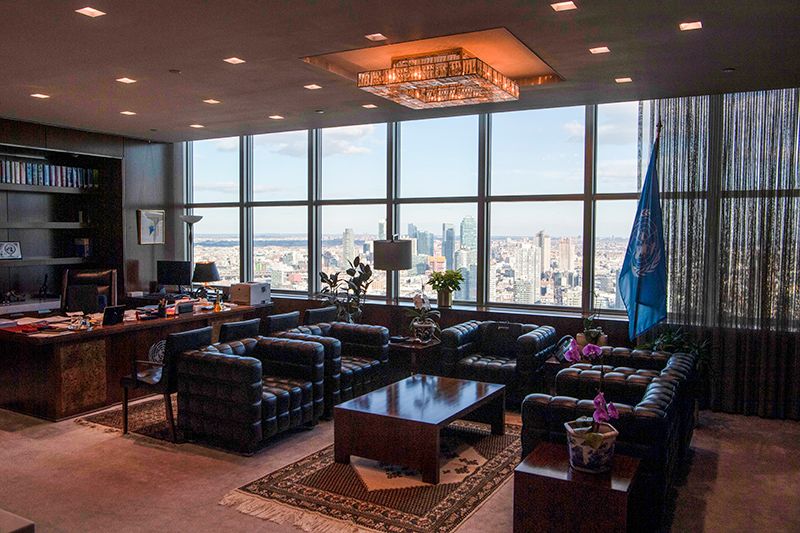
A view of Long Island City across the East River from the office of Secretary-General António Guterres located on the 38th floor of the Secretariat building at UN Headquarters. March 2019. UN Photo/Eskinder Debebe
Before the arrival of Ban Ki-Moon from Korea, who served as Secretary-General of the UN from 2007 to 2016, the townhouse got a $5 million upgrade that “included an overhaul of the central air and heating system along with a $200,000 kitchen upgrade. Unfortunately, the work took almost nine months to complete, so the secretary general spent the first part of his tenure in a hotel,” reported The Daily News. By 2008, the townhouse had an estimated value of $49 to $52 million.
The current Secretary-General António Guterres has taken a very different approach to the Sutton Place townhouse, saying in 2019 that that he wished the United Nations could sell the house to counterbalance cash flow problems but could not because the United States retains a claim to the house. He said, “I discovered that I couldn’t, because the residence can only be sold to the United States of America when we close the doors in New York.”
For the foreseeable future, the Sutton Place townhouse will remain in the United Nations’ ownership while the private apartment on the 38th floor has been mostly consigned to history. Fortunately, the photographs in the United Nations photographic archive remain so we can share this part of the UN’s history with you.
To mark the 75th Anniversary, the United Nations has launched UN75 — the largest, most inclusive conversation on the role of global cooperation in building a better future for all. Rather than having a traditional celebration, UN75 is giving the citizens of the world an opportunity to shape UN’s priorities, by inviting everyone, everywhere to have their say, and to share their ideas for a better future. The core of the initiative is a short, one-minute survey focusing on the key priorities for international cooperation. Results from the survey will be presented to world leaders and governments this September. In addition, the United Nations is holding UN75 dialogues, where organizations can hold virtual events to discuss key global issues.
Subscribe to our newsletter